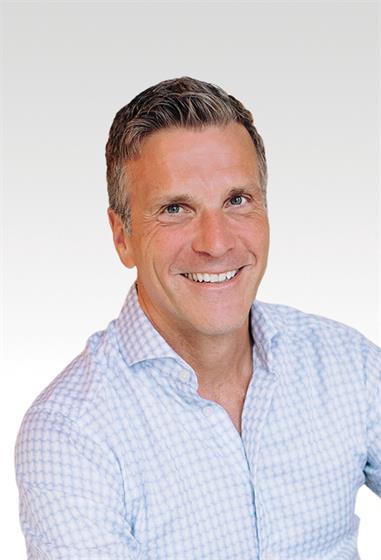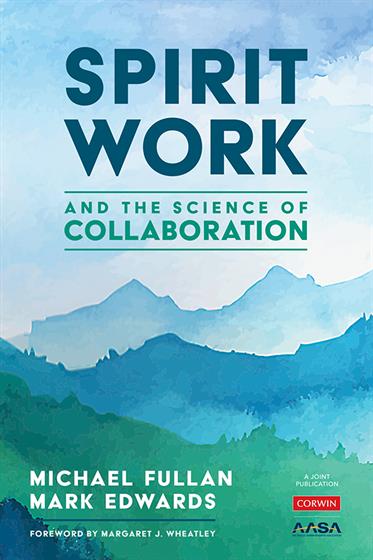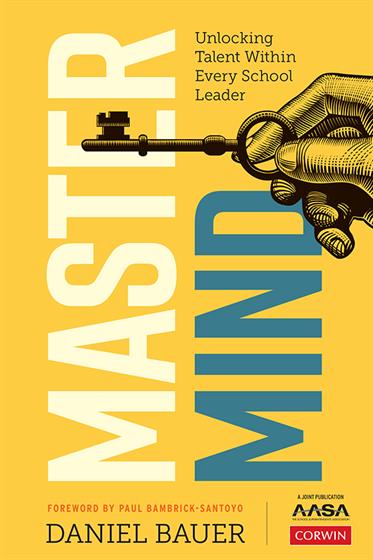Series 4 Leaders Coaching Leaders Podcast
[00:00:00.00] [MUSIC PLAYING]
[00:00:00.34] ANNOUNCER: Welcome to Corwin's Leaders Coaching Leaders
podcast with host, Peter DeWitt. This podcast is from education leaders for
education leaders. Every week, Peter and our guests get together to share
ideas, put research into practice, and ensure every student is learning not by
chance, but by design.
[00:00:19.63] TANYA GHANS: Happy Monday, Peter. I don't know if everybody's
going to be listening--
[00:00:21.98] PETER DEWITT: Hi, Tanya. Happy Monday. Always good to see you.
[00:00:24.21] TANYA GHANS: Always good to see you. I don't know if our
listeners will be listening to this on a Monday, but it's a Monday here for us.
And we have three really interesting guests who came on today. They
collaborated on a book that is recently out called 7 MindShifts for School
Leaders. And our three guests are Connie Hamilton, who is a author and a
consultant and seasoned educator for over 25 years. And Joseph Jones who's the
superintendent of a vo-tech school district in Delaware. And TJ Vari, who also
in Delaware and a superintendent in Delaware.
[00:00:59.41] So today's conversation I think is a really interesting one
because I think as much as we have COVID fatigue and we're ready to put COVID
in our rearview mirrors, we would be remiss if we didn't take some lessons that
we learned from that, and try to apply it into the work that we're doing in
education today. And I think the authors did just that. Here's some learning
gain during COVID as a springboard for keeping some of the important stuff, and
thinking about how it could impact the work that's going on in schools.
[00:01:33.20] PETER DEWITT: Yeah. Oh, for sure. I mean, it was really good--
I've known Connie for a few years now. And TJ, Joe, and I actually spent some
time together a few years ago in Chicago. So I started off by just asking how
they get together because sometimes--
[00:01:49.48] TANYA GHANS: Yeah.
[00:01:49.77] PETER DEWITT: --the common sense you wrote a book together
sometimes that's just kind of an interesting story for me to ask how they get
together.
[00:01:56.95] TANYA GHANS: Yeah.
[00:01:57.44] PETER DEWITT: But what I liked is that they took on a way of
approaching pretty much any issue that you might be facing. And then they have
these mindshifts that you would need in order to get into. And I really like
that phrasing of mindshifts. I think it's-- I always look at mindset especially
when it's collective leader efficacy that-- like how a team comes together and
how we have to shift our mindset as far as how is a team supposed to come
together in the first place?
[00:02:25.19] So they have these mindshifts. And I think we were able to get
into a few of them during the podcast. And I appreciated that quite a bit
because I think for me it needs to be very practical. Because when I'm on the
road I'm hearing people say, yeah, I understand theory, but. And it sounds like
they're doing a really good job with the what to do after that but.
[00:02:50.65] TANYA GHANS: Yeah. And so many little interesting pieces with
octopus and track runners, audiences, really you're--
[00:02:58.30] [LAUGHTER]
[00:03:00.30] You're going to be really shifting your mind in a few ways I
think when you listen to this podcast. So--
[00:03:05.36] PETER DEWITT: For sure.
[00:03:05.63] TANYA GHANS: Happy listening, everyone.
[00:03:07.46] PETER DEWITT: Yeah, happy listening.
[00:03:08.84] [UPBEAT SOUND]
[00:03:12.51] So, Connie, Connie, TJ, and Joe, welcome to the Leaders
Coaching Leaders podcast.
[00:03:17.01] CONNIE HAMILTON: Thanks for having us. Great to see you,
Peter.
[00:03:19.23] PETER DEWITT: Good to see you too, Connie. Thank you. Pleasure
to be here.
[00:03:24.49] TJ VARI: Thanks for having us on, Peter.
[00:03:25.95] PETER DEWITT: So congratulations on the book, 7 Mindshifts for
School Leaders. I have to ask you, I know the two of you are in Delaware. So
how did the three of you get together? How does that work?
[00:03:39.40] CONNIE HAMILTON: I was-- I was the first host on their
podcast, so we met that way. And we got talking about common interests and what
was needed. And we just kind of clicked. And this book came to be through a few
different conversations and ideas. And we seem to work really well together, so
we're off on a second project.
[00:04:02.85] PETER DEWITT: Oh, wow. Already? That's great to hear. So, TJ,
let me ask you, what are-- where did you come up with-- or why the subject of 7
Mindshifts for School Leaders, specifically?
[00:04:14.81] TJ VARI: Yeah, so what we learned, it's not a COVID book,
Peter. It's not necessarily about COVID, but what we learned about school
leadership during COVID is that we can make changes a lot faster to things that
are serious problems than we thought we could. And so we typically follow a
process for change. Takes a long time, and sometimes we have perennial problems
they just keep recurring. And we don't battle those problems the way that we
did during COVID.
[00:04:48.36] And we learned that we could pivot quick, we could change
things fast, and so the original title for the book was leading with a crisis
mindset that ended up being an individual chapter. But the point is that during
a crisis when we treat things like the crisis that they are, we make changes
fast. And so the seven mindshifts are seven different ways that we can think
about problems in a way that we can change them a lot faster than we typically
do.
[00:05:20.17] PETER DEWITT: OK, thanks. So, Joe, tell me-- give me one of
them. So we can-- so the leaders and the educators listening would understand.
[00:05:28.57] JOSEPH JONES: Yeah. I think it's important to mention, Peter,
too, a lot of this comes from spaces in which we're familiar with. In one way,
shape, or form you know we do these things to some degree. One that I really
like that I think just makes a ton of sense is the octopus approach. And we
spend a little bit of time talking about these fascinating creatures, the
brilliance, their IQ, how they run independently although they have these
incredible tentacles that listen to specific other brains.
[00:06:05.06] And when you look at the complexity of a school district, that
can either be a benefit or that could actually cripple the progress a district
is trying to make. So we take this approach to begin identifying, how can you
make progress in a district using systems thinking? And within systems
thinking, we then put out it's called LIST.
[00:06:30.77] And the LIST is just a short acronym to guide leaders on how
to make this approach. So you know from learning to temperament, how do we
constantly put ourselves in a state of perpetual learning but also have the
right mindset to have space and create space to recognize the importance of
things like SEL not only for our kids but also for our teachers?
[00:06:53.78] PETER DEWITT: So one of the things that the three of you
mentioned in the book is the whole idea of like models of thinking. So can we
break that down a little bit, Connie? And we start with you. What do you mean
by models of thinking and what does that exactly look like?
[00:07:11.16] CONNIE HAMILTON: So as Joe mentioned, we were looking at how
we can not only shift the way that we think about problems so that we can
tackle them from a new perspective and allow change to happen for some of these
lingering issues in education, but we also offer like a step by step process
for helping the readers to shift, make that shift.
[00:07:38.27] So a model Joe mentioned the LIST model. There are other
models that kind of walk you through a process of how you can abandon the gut,
the default, the normal way that you would approach a problem, and begin to
think about it more as there is no opportunity to put this on the back burner.
[00:08:03.69] PETER DEWITT: One of the things I'd like to get to is-- I
mean, there are definitely some hot topics that are happening across the
country, if not around the world. TJ, you had mentioned earlier social emotional
learning. And that's one of those topics that often gets pushed back whether
I'm writing the finding common ground blog for Adweek, or whatever. Social
emotional learning is one.
[00:08:25.48] Surprisingly, actually I was a little surprised when people
were pushing back on social emotional learning saying we were trying to
indoctrinate kids. So what do you say? Because I work with some principals and
school leaders in some very, very sort of extreme areas. And what do you say to
them when they're like, yeah, social emotional learning sounds great but I
can't touch that one without the community just freaking out on me. How does
the book help with that?
[00:08:53.94] TJ VARI: So I would lean on mindshift number five for that one
probably. My co-authors here could maybe say something about a different model.
But mindshift number 5 is leading with a disciplined tunnel vision. And that
one unfolds six very clear ways that you would go about instituting a change in
a school district starting with having a very clear and compelling vision.
[00:09:26.74] And so if you're going to do something like put social and
emotional learning, embed that in lessons, or try to go whole school or whole
district with that, we would say follow a model that would help you put that
into the community, get that into the classroom in a way that just isn't you
showing up at a faculty meeting and saying let's do social and emotional
learning.
[00:09:49.03] Or send somebody to a conference or you read an article about
it, and now it's something that you want to do. Even a book study great first
step, but as not necessarily going to embed that into the culture in a way that
you would need to do. So discipline tunnel vision helps leaders to follow a
six-step process in putting something into practice, and getting something from
concept to culture.
[00:10:13.58] PETER DEWITT: Great. Joe, Connie, any follow--
[00:10:15.83] CONNIE HAMILTON: Yeah.
[00:10:16.19] PETER DEWITT: --up there?
[00:10:16.73] CONNIE HAMILTON: I do, actually. I would also say that looking
at the mindshift number six which is leading with a yes and attitude. So
oftentimes issues like exactly what you said, the community won't go for it, we
can't do that here. This isn't the place for it. So instead of allowing that to
be a barrier, we embrace that.
[00:10:38.15] Yes, that is true, and then the next conjunction there really
says, what are we going to do about it? Is that a full stop? Or do we say
"and." That's something we need to consider. Is how are we going to bring
the community on? What communication methods are we going to use? What can we
anticipate is going to be the pushback? And how can we prepare for it? So that
leaders are able to make tough decisions even when they don't have the support
for it yet.
[00:11:09.17] Again, it goes back to the essence of what the book is
designed, and what this idea is that too many problems like SEL get marinated
forever until they sour. And nothing gets done or solutions, real solutions
aren't put into place because there are too many barriers. So embracing that
mindshift of yes, that is a problem. And what other problems are there? And
what other problems? So the process of revealing and identifying what barriers
or challenges will surface again helps us to better define what the problem
looks like.
[00:11:48.99] PETER DEWITT: Joe, one of the things I wanted to ask you
about-- and by the way, I love both of those mindshifts. Sorry that didn't say
that. Joe, one of the things I wanted to talk to you about is like I always
find that these days I have leaders that say time is an issue. Like I know TJ
at the beginning you said during COVID it was like you were finding that it was
easier to pivot. I'm actually finding the opposite to be true these days with
more resistance, and I'll have teachers and leaders save time. So how do you
help leaders evaluate the difference between something that's urgent and
something that's important so they make the time to be able to do that?
[00:12:31.75] JOSEPH JONES: Yeah, it's a great question, Peter. I would back
up to begin with is how people are doing. Period. So we can knock things like
SEL, but I think it's critical as just a society to recognize that when we
start expressing our frustration about things whether it's time, or activities,
a lot of that is a secondary response. The primary response are people are
frustrated. They're unappreciated. They don't feel like what they're doing is
making a difference. There's a disconnect. Those are the primary issues that
are going on that we also see more amplified during COVID.
[00:13:15.70] So now when you hear individuals say, well, I don't have time
for that, usually that's a manifestation of something else. And I do believe
very much, though, we are being put upon as an education system because this is
the hub. We saw this in COVID. That the really only place to connect students
and everyone else was through schools. Other primary places that we used to be
able to do this in communities are fractured. So schools quickly became places
to feed students even if it was on curbside pickup, whether it was to host, and
actually have your front parking lot set up as a COVID response center.
[00:13:57.05] So I don't think anything has changed in that regard. But then
when it comes to teaching and learning and protecting the most important space
in the school, that's where teachers like, well, I got to do this training, I
got to do that training. And principals feel the same and superintendents feel
the same that we can suddenly feel overwhelmed.
[00:14:17.34] So I think we have to take a clear audit of everything we're
doing, and then eliminate those things that aren't as productive as they should
be. And that can start to help with the urgent versus the non-urgent. But I
will say a byproduct of what people are feeling is at least from my experience
is that during COVID everything was urgent.
[00:14:40.26] PETER DEWITT: Mhm.
[00:14:40.63] JOSEPH JONES: And so we started like abusing email. We're
trying to solve complicated issues right now through email. We got to pick the
phone back up, get back in a meeting, and quit using certain tools wrong ways.
And I've noticed that across the board not just in my district but in others.
But I would say do the time on it, figure out exactly what is critical, what's
most important to students and staff, and what's going to help student
achievement.
[00:15:08.62] But then also see a lot of these things as manifestation of
deeper issues like building that connection back with staff and students.
Getting priorities straight again. Helping teachers feel that they're really
are making a difference. There's never been more important time for staff
support, and getting them once again to feel like they're doing incredible
things in the classroom. And I think some of these other issues will start to
wane.
[00:15:36.94] PETER DEWITT: I agree with you. I-- it was very eye opening
for me a couple of weeks ago. I was running a workshop in a southern-- in a
state, I'm not going to mention the state. But I was running a workshop on
collective leader efficacy, and I had groups of people that showed up and when
I asked a group why they were there, not like pointing at them, why are you
there, just, why are you here? They had no idea. They didn't know why they were
there. And thought, wow, you're coming in for six days with me over the next
three months and you really have no idea why you're there?
[00:16:09.56] And another team had them do this group CV activity. And there
were teachers that are on the group that they didn't know what they brought of
value. And just simply after an activity like that they found they had 162
years of combined experience, and they started to really engage a lot more. And
feel like you're absolutely right.
[00:16:31.52] For too long we've had teachers and leaders to show up to
workshops or conferences or whatever just even at the district office, and they
don't even know why they're there. And that's completely unfair, and it's led
to a lot of these issues. One of the things-- I'd like to actually throw out
some-- how about I throw out some hot topics and you guys kind of connect with
the mindshift?
[00:16:56.57] Because TJ I liked how you did that earlier. And I think
that's really helpful for me as well. You were all mentioning in one way,
shape, or form the whole idea of teachers. And one of the issues that we're
having is a worldwide issue. This is not just a US issue, but a worldwide issue
is that of the teacher shortage. So is-- are the mind shifts that you have
something that can intersect with this issue of the teacher shortage? TJ, I see
you shaking your head. So would you mind like giving me an example?
[00:17:29.87] TJ VARI: Sure thing. So think the thing about the mindshifts
is that they're applicable to pretty much any problem that you have.
Specifically ones that are important, urgent, and persistent. So we define that
early on in the book as a filter of important urgent and persistent things that
aren't just a hot topic of the day. But like you said, the teacher shortage
it's a national problem. We've seen it come in for a while now. COVID
exacerbated it, it's again, it's not something that's brand new to us. It
didn't just happen overnight.
[00:18:12.28] But I would actually apply leading with a beginner's mind,
which is mindshift number three to that one. Because a lot of times what we
think in the old model is, all right, I have 32 kids times 3 or 32 kids times
4. I need a teacher to solve that problem. We have a vacancy, hire a teacher.
That's true, we're always going to need teachers. But in a crisis like a
teacher shortage, we need to think about that problem in a totally different way.
[00:18:44.12] And the beginner's mind would tell us, let's start with a
learning mindset in really approaching this in a way that we don't totally
understand. Which abandons the previous model of a teacher for every 30 kids or
every 32 kids. And would say, no, you actually have a problem where these kids
need to learn math. It's not necessarily that they need a teacher.
[00:19:07.37] And so, how can we make the system create a system where the
kids learn math in the absence of a teacher? Now we're going to talk about
thinking about this in a totally different way. I've talked to colleges and
universities who are now teaching calculus to kids in high schools because they
have a calculus professor who can fill that void.
[00:19:29.96] We've opened up spaces. In my own district, we just knocked
down a wall in one of our middle schools so that more kids can sit in a room.
It wasn't that we were able to add a teacher but we were able to add supports
in that space for a teacher to work with more kids. It's things like that, but
you have to abandon the previous model, and think with a beginner's mind. And
that's what I would approach that problem with mindshift number three.
[00:19:56.81] PETER DEWITT: So let's try one more, quiet quitting. This is a
new word. Honestly like when it first came up I had to go and look it up
because I was thinking, what is quiet quitting? But just a few weeks ago with a
group in Ontario that was talking about they said that they've got some leaders
that are going through this whole idea of quiet quitting.
[00:20:16.28] They're starting to abandon, no, I don't want to be on that
committee, or I don't want to do these kind of things. Is there a mindshift
there that can help school districts or school divisions, school boards, whatever
we want to call them, depending on where we are with something like quiet
quitting, Joe?
[00:20:39.10] JOSEPH JONES: Peter, for that one I would relate-- and I'm not
sure if Connie and TJ agree with this, I would go back to chapter one with this
and leading with a crisis mindset. The whole notion is that we often will
pursue things certain ways the way we confront a crisis. And I think with quiet
quitting we all suddenly I've heard this term in the last like two weeks 30
times.
[00:21:08.11] PETER DEWITT: [LAUGHS]
[00:21:08.47] JOSEPH JONES: Like you said, Peter, everybody's talking about
quiet quitting.
[00:21:11.02] PETER DEWITT: Like where did this--
[00:21:11.80] JOSEPH JONES: And--
[00:21:11.95] PETER DEWITT: --come from?
[00:21:12.55] JOSEPH JONES: Yeah, one thing that we've tried to do in this
book is kind of highlight how we approach problems. And so for example, we talk
about in the first mental shift of leading with a crisis mindset the starting
block syndrome. And the starting block syndrome is just how we relate like
track and field to the classroom.
[00:21:37.33] And so in a classroom, we'll give teachers new-- just things.
Just buy them a thing. We all-- it might be a program and we have thousands of
programs we could all choose right now. But then we'll give them an hour's
worth of professional learning on it. And we've seen this time and time again
that like the starting blocks in track and field can actually be a disservice
to the athlete if not used correctly. And it just leads to frustration, could
also lead to injury.
[00:22:11.04] And in the classroom, we see this time and time again. We'll
want to improve reading scores. You know, so we'll focus on reading scores. And
then here's a great program that will help with reading scores. Although we
haven't taken into account we have four new teachers that may have to use this
who right now might be struggling more with climate and classroom culture than
the reading. So we put them in a PD with the new program, and what we fail to
do is recognize their needs.
[00:22:43.58] Now, exacerbate that over time and you can get some teachers
who feel like we just are insensitive as leaders to their needs. And I can tell
you we've tried in my own district to go on listening tours, and just listen to
help inform us. And I know that can even be controversial. I've heard people
say, you know that's not effective either.
[00:23:06.53] But when you have a staff of over 500, you want to try to get
some inclination on what they're experiencing and quit trying to solve problems
as you see them. And I would like to think that that first chapter does that to
some degree. It starts really talking about our relationship with crisis. Some
of the faux pas that we make, and then the best way to move forward.
[00:23:32.97] PETER DEWITT: I have to admit I'm a little shocked that
somebody would say that a listening tour is not going to be effective.
[CHUCKLES] Listening tours are effective. Especially when you actually listen.
So that's--
[00:23:44.95] JOSEPH JONES: That's the key. That's the key.
[00:23:46.99] PETER DEWITT: That's very--
[00:23:47.65] CONNIE HAMILTON: [LAUGHS]
[00:23:47.98] PETER DEWITT: --funny when you hear somebody say that. So I
have one last question for you because I think, Joe, probably intersects with
what you were just saying because one of the things that I read about the book
is it said, lots of the problems with school leadership stem from the fact that
leadership is often counterintuitive. What does that mean? Because I think I know
what it means, but I'm not so sure if I know what it means. So who would like
to take that one on? I'll leave it open.
[00:24:16.35] TJ VARI: I can start. I can start with that one.
[00:24:18.91] PETER DEWITT: OK.
[00:24:19.30] TJ VARI: Leadership I think what we find is that leadership is
dichotomous. A lot of what we think is the right thing to do is not always the
right thing to do. And what we tell especially new leaders sometimes quite
frankly scares me. And the example I would like to point to in terms of the
counterintuitive part, I like to use trust as the example there. Build trust,
how do you build trust? Build relationships. These are the things that we tell
leaders to do.
[00:24:52.48] But actually, if you look at Covey's 13 High Trust Behaviors,
a lot of those behaviors are about accountability, clarifying expectations,
confronting reality. When we do things like confront reality, set new
expectations and become effective, then we build trust. In an environment where
we're not effective, like the problems that we're trying to illuminate here
third grade reading scores in a district. If kids can't read by the third
grade, they're really going to have trouble reading to learn from there on out.
[00:25:33.57] So confronting reality would be a really good thing to do
there. And what that does is build trust. But that's not what we always tell
leaders. Lead with a clear and compelling vision. That's back to one of the
mindshifts. Start there. It's much more likely that you'll end up with trust and
relationships if you do that than if you go around trying to build trust and
relationships. Which is not only elusive, but could tell leaders-- could direct
leaders in a wrong way.
[00:26:03.96] What people don't need is their backs rubbed and to have a
pity party for them. They don't need that. They do need clear expectations back
to quiet quitting. When people are working in an effective environment where
they also feel effective, that's the self-efficacy. Peter, you're very familiar
with collective efficacy. When we're building that we're much more likely to
have an environment where people want to stay, people want to feel good about
themselves, and they end up with trust and quality relationships.
[00:26:35.25] PETER DEWITT: Yeah, I think those things can be done
simultaneously. They don't-- it's not either or. So I just want to thank you,
Connie Hamilton, Joe Jones, and TJ Vari for coming on. Congratulations on the
book, 7 Mindshifts for School Leaders. It is-- it sounds like a very intriguing
read. So thank you for being on the Leaders Coaching Leaders podcast.
[00:27:00.27] CONNIE HAMILTON: Thanks, Peter. It's always great to see you.
[00:27:02.50] [UPBEAT SOUND]
[00:27:04.27] PETER DEWITT: So, Tanya, what did you think? Did I do all
right?
[00:27:07.79] TANYA GHANS: Oh, Peter, you always do more than all right.
[00:27:10.43] PETER DEWITT: Oh, well, thank you. That was-- kind of-- I was
kind of fishing for a compliment there but--
[00:27:14.90] TANYA GHANS: [LAUGHS]
[00:27:16.65] PETER DEWITT: No, it's always-- what people need to know,
though, is when you're moderating a conversation you've got three guests, it's
always a little tricky because you want to make sure you get to everybody,
right?
[00:27:27.33] TANYA GHANS: Yeah, yeah.
[00:27:27.90] PETER DEWITT: You give them equal time and-- but they were all
able to bring something different to the table which I think is really
important. And just talking about one of-- probably the one thing that I really
enjoyed the most was when they brought up the beginner's mindset.
[00:27:47.13] TANYA GHANS: Yeah, yes.
[00:27:48.75] PETER DEWITT: I've heard that. I've heard that phrasing
before, and you'll hear the learner's mindset and those kind of things. And I
think it's really important for school leaders to try to get back to that
space. Especially for those-- I'm working with a leader that said they lost
their why. They--
[00:28:05.37] TANYA GHANS: Yeah.
[00:28:06.18] PETER DEWITT: Just been so much going on. And trying to bring
them back to that whole idea of the beginner's mindset, the learner's mindset,
why did you-- why did you enter into this in the first place? And what can we
learn from this situation? To me is a really powerful way to approach any
situation.
[00:28:25.22] TANYA GHANS: Yeah. I think there's something there because
that's exactly the habit that lingered with me. There's a few of them, but that
beginner's mindset think phrasing that way does do something different than
even saying learners. It's really-- not blank slate, it's hard for us as human
beings to do that.
[00:28:44.84] But as much as you can let-- and think this also ties into
another one of their habits. But as much as you can let go of what you think
you know about a situation and come into it brand new, I mean, that just opens
the door for thinking outside of the box. Which a theme for this book with
solving perennial problems. That's really the biggest hurdle is just to step
away from everything you think you know about this, and really try to look at
it as though nothing about it. [LAUGHS]
[00:29:13.61] If you want to try to solve it, so I think this book is going
to help people do that. Like exhale. [LAUGHS]
[00:29:20.98] PETER DEWITT: Yeah. And I will say-- I mean, even within one
of the examples they gave me showed that the three of them had to have a
mindshift because they mentioned that they were going to call it "Leading
during a Crisis." And I'm glad they changed that title.
[00:29:36.46] TANYA GHANS: Yeah.
[00:29:37.18] PETER DEWITT: Because it's-- leading during a crisis for the
title of a book kind of limits what this book is actually about.
[00:29:48.07] TANYA GHANS: Yeah.
[00:29:48.82] PETER DEWITT: And I think by opening it up and talking about
the seven mindshifts I think it really opened it up to a much broader and
better audience, and it really probably captures exactly what the book is
about.
[00:30:03.04] TANYA GHANS: Yeah, it's far more aspirational.
[00:30:04.21] PETER DEWITT: Not just about the crisis, it's about-- it's
about more than just a crisis. I mean, crisis is important, we know that, but
it's about more than that. And I think the title actually helps capture that
much, much better.
[00:30:14.72] TANYA GHANS: Yeah, I would agree. As the editor too I really
agree.
[00:30:19.16] [LAUGHTER]
[00:30:21.99] Oh, so listeners, I really hope you enjoyed this episode. I
know again I'm the editor, I've seen the book and I still want to go look at it
again. [LAUGHS]
[00:30:30.00] PETER DEWITT: Yeah.
[00:30:30.57] TANYA GHANS: So they did a fantastic job. And as always it's
great learning with you, and I'm going to see what I can put a beginner's
mindset on for today in my own life because I'm sure somewhere it is needed.
[00:30:44.25] [LAUGHTER]
[00:30:45.77] PETER DEWITT: Especially on a Monday.
[00:30:47.94] TANYA GHANS: On a Monday.
[00:30:49.07] [LAUGHTER]
[00:30:50.37] It is needed.
[00:30:51.78] PETER DEWITT: All right, Tanya--
[00:30:52.58] TANYA GHANS: All right, Peter.
[00:30:52.79] PETER DEWITT: --well, it's always good to see you. Thank you
to the listeners for always listening to the podcast. So until next time.
[00:30:59.90] TANYA GHANS: Until next time.
[00:31:01.02] [MUSIC PLAYING]












